

Table of Contents. Focus-groups.pdf. Deloitte-focusgrp.pdf. p417-turk.pdf?ip=140.182.176. p356-hoffman.pdf?ip=140.182.176. Essential Computer Skills for College Students: Business and Management Journal Article. Abstract Computers have a growing presence in all levels of education and in all kinds of occupations.
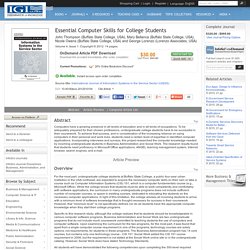
To be adequately prepared for their chosen professions, undergraduate college students have to be successful in their coursework. To achieve that success, and in consideration of the increasing reliance on using computers in their personal and work lives, students need a certain level of expertise in identified computer applications. Incorporating interviews and surveys, this project researched the computer knowledge needed by incoming undergraduate students in Business Administration and Social Work. The research results found that students need proficiency in Microsoft Office applications, ANGEL learning management system, Internet browser, search engines, and e-mail. Article Preview Overview All students will have demonstrated the following competencies upon completing the 300-level required social work classes:
5 Must-Have Tech Skills for College Students. College students must learn proper online etiquette, including how to interact with professors and on social media platforms.
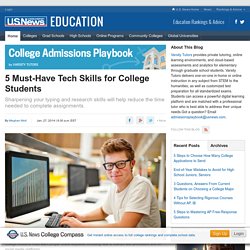
It may not seem immediately apparent, but possessing a solid foundation in using daily technology can greatly smooth a student's transition to college academics. In order to be successful, there are a few technical skills students should develop long before reaching college. 1. Typing ability: You will type a great deal at college while searching the Internet, sending emails and writing papers. Accurate and swift typing is essential as the more time you require at the keyboard, the longer you will take to complete assignments.
Learn to type correctly by purchasing a software program and practicing daily. [Remember to practice college study skills in high school.] a6-hoar.pdf?ip=140.182.72. Generally Educated In The 21st Century. p52-hardy.pdf?ip=140.182.72. p508-kvasny.pdf?ip=140.182.72. The influence of self-efficacy, gender stereotypes and the importance of it skills on college students' intentions to pursue IT careers. Diversity-related themes such as social inclusion, community informatics, and broadening participation in undergraduate and graduate education are consistently discussed at the i-Conference.
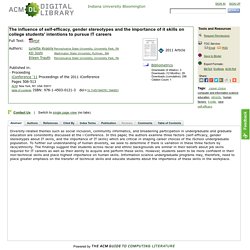
In this paper, the authors examine three factors (self-efficacy, gender stereotypes about IT skills, and the importance of IT skills) which are critical in shaping career choices of the iSchool undergraduate population. To further our understanding of human diversity, we seek to determine if there is variation in these three factors by race/ethnicity. The findings suggest that students across racial and ethnic backgrounds are similar in their beliefs about job skills required for IT careers as well as their ability to acquire and perform these skills. Do students have the relevant ICT skills they need to do their research projects. The final year research project is the capstone of undergraduate studies.
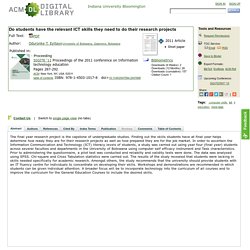
Finding out the skills students have at final year helps determine how ready they are for their research projects as well as how prepared they are for the job market. In order to ascertain the Information Communication and Technology (ICT) literacy levels of students, a study was carried out using year four (final year) students across several faculties and departments in the University of Botswana using computer self efficacy instrument and Task characteristics. Prior to administering the questionnaire, a pilot test was conducted and reliabilty and validity tests were done. The data was analysed using SPSS. p287-eyitayo.pdf?ip=140.182.72. p57-klein.pdf?ip=140.182.72. p95-pfefer.pdf?ip=140.182.72. p29-beltaine.pdf?ip=140.182.72. p127-vucinich.pdf?ip=140.182.72. p9-gupta.pdf?ip=140.182.72. p53-johnson.pdf?ip=140.182.72. Results (page 1): 5 Must-Have Tech Skills for College Students - College Admissions Playbook. Essential Computer Skills for College Students: Business and Management Journal Article.
1-s2.0-S0360131512001005-main. Digital Literacy: A Conceptual Framework for Survival Skills in the Digital era. Ej1026longer.pdf. Study Proves Why We Need Digital Literacy Education. A few months ago, the Internet buzzed with the results of a study comparing students' note-taking on computers versus note-taking with paper and pen.
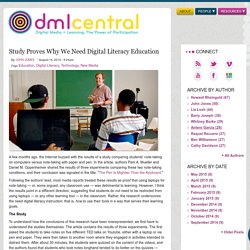
In the article, authors Pam A. Mueller and Daniel M. Oppenheimer shared the results of three experiments comparing these two note-taking conditions, and their conclusion was signaled in the title: "The Pen Is Mightier Than the Keyboard. " Following the authors' lead, most media reports treated these results as proof that using laptops for note-taking — or, some argued, any classroom use — was detrimental to learning.
However, I think the results point in a different direction, suggesting that students do not need to be restricted from using laptops — or any other learning tool — in the classroom. The Study To understand how the conclusions of this research have been misrepresented, we first have to understand the studies themselves. Of course, people generally do not take notes expecting that this activity alone will help them remember. What Digital Literacy Looks Like in a Classroom - Education Week Teacher. Digitalliteracy.gov. Movement Grows to Assess Students' Digital Literacy. What Digital Literacy Looks Like in a Classroom - Education Week Teacher.